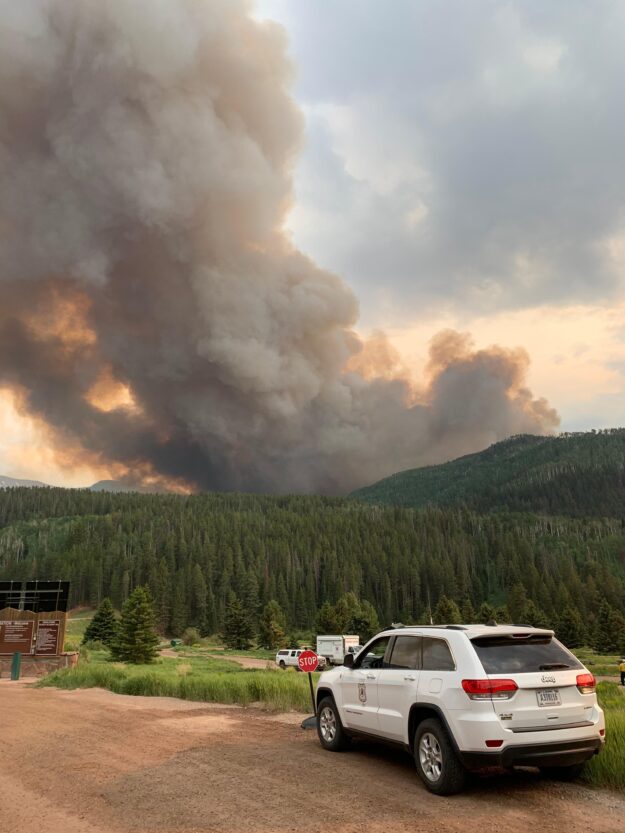Widgetized Section
Go to Admin » Appearance » Widgets » and move Gabfire Widget: Social into that MastheadOverlay zone
Opinion: Human-caused climate change no longer a subject for political, policy debate
June 28, 2021, 11:48 am

In 1970, George S. Benton, in his time one of the nation’s leading atmospheric scientists, wrote about a rise in the Earth’s mean temperature since 1880.
“The cause of these changes has been under extensive study,” Benton wrote. “One factor is the steady increase in carbon dioxide which has been observed, presumably as a result of the combustion of fossil fuels.” The rate of warming, he said, “would therefore (if extrapolated to 2000 A.D.) result in a warming of about 0.6°C — a very substantial change.”

Benton was among the first to try to predict the effects of a changing climate.
At the time, there was little way to gauge the accuracy of climate models. Now there is.
How reliable have climate models been? A NASA science writer said last year, “A new evaluation of global climate models used to project Earth’s future global average surface temperatures over the past half-century answers that question: most of the models have been quite accurate.”
The evaluation showed, with scientific authority, that global warming actually occurred the way the models had previously predicted it would occur. And many of even the earliest modelers understood that “many major drivers” of climate change “result from human activities and decisions.”
A common prediction contained in climate models was that forest fires would get bigger and the fire season would get longer. As most Coloradans know, fires are actually raging across the state the way the models predicted they would.
That’s why climate skeptics long ago lost credibility. And today we can say with certainty that climate deniers don’t belong anywhere near public policy debates.
Yet skeptics remain in positions of power. Deniers still occupy elective office. Doubters continue to put lives and property in Colorado at risk.
One of the more inveterate doubters is state Rep. Andres Pico, a Republican from Colorado Springs. As late as 2019, when Pico was a Colorado Springs City Council member, he responded to a student demonstration to raise awareness about climate change by writing, “I think you all would be a lot better off if you all stayed in class and learned some actual science rather than debunked one-sided propaganda.”
By this year, during the legislative session, Pico could at least bring himself to say, “I don’t know of anyone who disagrees that climate change has happened, is happening, will happen in the future.” But then he said, “What we disagree with is why, what’s driving it, and to what — pardon the expression — degree.”
No serious person disagrees on the why — human activity — and no denier like Pico has any business influencing momentous decisions related to climate policy.
Pico, however, was outdone by a colleague across the Capitol, Chris Holbert. Holbert, the Senate minority leader, during debate on a crucial greenhouse-gas emissions bill, referred to “so-called climate change” and declared, “I do not believe that it is man-made.”
This is the leader of the GOP Senate caucus. Offered a chance to clarify these remarks by Complete Colorado columnist Ari Armstrong, Holbert confusingly wrote, “I believe that the climate is changing and that such forces of nature are beyond the ability of humankind to stop.” And he told Armstrong, “I think people who embrace man-made climate change use that as a means to infringe on personal freedom and liberty.”
Conceiving of climate change as something one “embraces,” as if it’s like a political preference for tax cuts or single-payer health care, demonstrates a failure to grasp the existential threat it represents.
Holbert lives in metro Denver-adjacent Douglas County, so maybe he can be forgiven for misunderstanding what climate change is doing — right now — in the Colorado mountains. Climate change isn’t something Coloradans embrace. It’s a phenomenon that sometimes forces them to run for their lives. This week four wildfires bigger than 3,000 acres were burning on the Western Slope. They are part of an early and ominous start of the fire season. The early and ominous nature of the season was predicted, and it’s due largely to human activity.
Last year — when 650,000 acres burned in Colorado, two people died, and the Cameron Peak Fire destroyed more than 220 homes — was Colorado’s worst fire season ever. The three largest wildfires in Colorado history all occurred in 2020, and the state’s 20 biggest fires on record have all occurred in the past 20 years.
The cost in loss of property, natural resources and human health just in Colorado, just in terms of fires, is staggering, let alone the total global cost of climate change in all its forms of devastation. Climate change is now an emergency feature of Coloradans’ lives. That’s why any elected official who is not prepared to approach human-caused climate change as a crisis should find another line of work and let the grown-ups handle public policy decisions.
Other climate doubters represent Colorado constituencies, though these days most have dropped expressions of outright denial and instead take a position that acknowledges climate change, and even its human causes, but argues climate action isn’t worth risking jobs or industry profits over.
U.S. Rep. Ken Buck once said the “evidence just keeps supporting” the view that global warming is a “hoax.” Today a tweet in which he wrote that “Biden’s plan to banish fossil fuels is a greater existential threat than climate change” typifies his softened stance. In one of the first bills she introduced as a member of Congress, Rep. Lauren Boebert, who represents the Colorado district most at risk for wildfires, tried to block the United States from reentering the Paris climate agreement, saying that it would kill jobs and increase energy costs. She also decried the Biden administration’s pause on new federal oil and gas leases on the ground that it was an “unlawful attack” on the livelihoods of her constituents.
It counts as some kind of progress if most leaders these days refrain from “hoax”-level dismissals. But if their mere acceptance of climate change does not inspire support for immediate and monumental action, they are no more good to us than quacks and conspiracists, and it would be safe to predict that their presence in legislative chambers will mean that much more of the Earth will burn.
Editor’s note: This opinion column first appeared on Colorado Newsline, which is part of States Newsroom, a network of news outlets supported by grants and a coalition of donors as a 501c(3) public charity. Colorado Newsline maintains editorial independence. Contact Editor Quentin Young for questions: info@coloradonewsline.com. Follow Colorado Newsline on Facebook and Twitter.
Quentin Young
Latest posts by Quentin Young (see all)
One Response to Opinion: Human-caused climate change no longer a subject for political, policy debate
Recent Posts
- Forest Service seeks comment on power line project near Minturn
- Vail Fire & Emergency Services hosts fourth annual Free Community Workdays
- Andrew Villescas promoted to head professional at Vail Golf Club
- Stoke & Rye hosting La Dolce Vita: Twirl + Swirl pasta-making class on July 30
- Eagle County Fair and Rodeo features free music
- Insurers seek nearly 40% increase in premiums on Western Slope as state blames federal policies
- Colorado GOP House members call out Trump on Epstein case but vote against public transparency
- Gart Properties acquires Edwards Corner
- Beaver Creek Blast set for July 23
- When professional disputes collide with legal boundaries



Ted Ligoty
June 29, 2021 at 7:04 am
The root cause of the problem is the overdevelopment and the outrageous population explosion that has been going on for the last two hundred years. Until the root cause is addressed and no politician will do that not much will change. My advice is to buy air conditioning. This population problem has been a disaster for the environment in every imaginable way with the damage extending far beyond the climate. The best thing we can do at a local level is to stop development of our land and growth of our communities. Double the number of people in Eagle county and you double the chance of a human caused fire and many of them are.